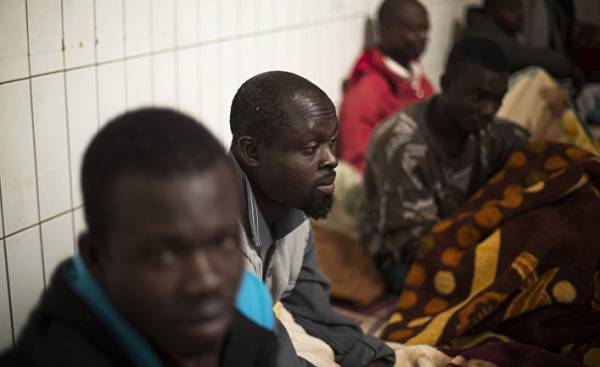
In the city of Sabha in southern Libya with a population of about 100 thousand people there is a place known as “the ghetto of Ali”. These words make you cringe 18-year-old Gambian Abu Bakar Yau (Abou Bacar Yaw), which stayed there for two months.
According to witnesses, the ghetto Ali is housed in a former prison. Before the war ended with the death of Muammar Gaddafi, via the Sabha ran one of the migration routes from Central Africa to Europe. There were detained and deported to his homeland of many immigrants from this region. In addition, the Sabha was relatively attractive city for tourists, adventure lovers.
The stories of Abu Bakar, today this building is comprised of cells and courtyard, abandoned, full of rats and dust. Hundreds of young Africans are in tight spaces without light and ventilation. This place is run by the Libyan tribe of the tube, which is called Ali. Around, on the streets of Sabha, set paramilitaries, smugglers, mafia and simply armed citizens. This area is closed to the public.
Abu Bakar was there after a five-day non-stop crossing of the desert. The starting point was the city of Agadez in Northern Niger, and there he returned after a few months. Sitting on the old chair, he talks about his misadventures under the sonorous call to prayer from the nearby mosque. According to Abu, near the left eye which has a scar in Sabha know all about ghetto Ali. “But it all makes no difference because Libya is hell. All are armed. Even children walking around with guns. And no one cares neither good nor evil,” he says. It seems that what is happening in the ghetto Ali, does not cause anyone much concern.
“I had pre-paid the fare to Tripoli. I paid for it in the Agadez before departure,” says Abu Bakar. It cost him a 381 Euro savings of the whole family. “But I did not get to Tripoli,” — he sighs. When they reached the Sabha after crossing the Sahara, the driver took his passengers in the ghetto. “There were Libyans in a military uniform and with weapons. Don’t know if it was soldiers, rebels or someone else,” he says. Abu and his companions pushed into the building, saying that they do not pay the fare, although it was not so, and put them under lock and key without further explanation.
For two months, while Abu was in the ghetto, he was given a glass of water and a loaf of bread a day. He estimated that there were about 300 people, only men. Those who died, some had to get outside and burn the bodies in a vacant lot near the jail. “Every day there came the Arabs, sometimes accompanied by bodyguards, and we were taken out into the yard. There we had to sit in a row so (Abu sits on the floor, spreading the feet), every sat between his legs, who was in the back. Formed something like a train on the ground,” recalls Abu. He again sits on the chair and continues the story: “the Arabs walked among us and took away some. They usually chose a strong, those who, most likely, will not die in a few days. They were chosen as the mangoes in the fruit market. Then they paid the overseers of the ghetto and took away the goods. The Arabs came every day to buy us.”
Abu sold in two months. “I don’t know how much paid for me. When we are not talking about money, retreated into a corner to haggle,” says the Gambian. Abu falls silent, looking in front of him dimmed eyes. And continues again: “Ghetto Ali — just the kind of place that I imagine when talking about slave markets”. In the city, until recently, considered a tourist in the country, 400 kilometres from Europe, a thriving slave trade in the XXI century!
The Libyan “black hole”
Before the war — the conflict that erupted in 2011 in the continuation of the Arab spring through Libya ran one of several migration routes to Europe. The representatives of mafia structures preferred in some cases to smuggle migrants to Mauritania, and from there by boat to the Canary Islands; or they crossed Algeria, and when we got to the border with Morocco and moved to Melilla; or tried through Libya to get to the coast, to sail on rafts to the Italian island of Lampedusa.
Today Libya lies, perhaps, the only way to Europe. In a country with such chaos that the mafia and traffickers can easily up camp anywhere, as in other countries the borders are under control. Every town in Libya is under the control of different armed groups. And migrants are trying to use the confusion to cross the sea. According to the International organization for migration (IOM), today in Libya blocked about 330 thousand migrants.
The problem is that this mess has its downside: in the absence of any control thousands of men and women become the prey of thieves. In the last few months, kidnapping has acquired a new twist: a growing number of slaves.
In April of this year, the IOM — an organization under the auspices of the UN published a report stating that in Libya for several months, there are slave markets where they sell migrants to use them as workforce, staff or sex slaves.
The Director of IOM mission in Niger Giuseppe Loprete (Giuseppe Loprete) said, sitting in his office at the mission in Niamey that “migrants who returned from Libya, told stories about beatings, auctions, buying and selling slaves.” Sinister journey into the past on the opposite coast of the Mediterranean sea! Ghetto Ali, where he was sold to Abu, is one of these markets.
We are not talking about kidnapping for ransom, or the exploitation of labor, nor on the possibility to pay for the release. We are talking about the slave trade, when the people of Libya buy immigrants from sub-Saharan Africa to work in their homes, farms or fields, without any wages, except food and shelter, in terms of ill-treatment.
IOM said this, and now the eyewitnesses who managed to escape, began to testify. But the international community has done little to put an end to this nightmare of the last century.
Sold for 3200 euros
“I want to tell the world about what’s going on,” says 39-year-old Adaman Agachly (Achaman Agahli) — a man from the city of Agadez. It takes us at home, which is a structure, built of mud bricks, where people live together and goats. Acumen, engaged in transportation of cans between the villages in the desert. His friend encouraged him to try to reach Europe to make a living. He consulted with his wife and, having decided on this step, went in June last year, climbing three hours of the night in the back of a white Toyota pickup truck. Before leaving he heard the smuggler who was paid for the carriage, said by phone: “I’m sending you a batch of 25”. At that moment, Acumen did not attach importance to him. And only after some time he realized the meaning of this phrase.
“First, it was assumed that we will take to the town Madame, on the border of Niger and Libya, but we drove on, and left us in Catrone, in Libya. There we were picked up by the Libyans from the local tribe of tuba. They all wore a beard and was armed. I was told that there are problems, there’s something missing. We were taken to Sabha and placed all in one room in an abandoned building,” he continues his story.
Acumen, held under lock and 26 days. “We were given bread and milk. Then one of the guards said that more will not give us anything that we didn’t have the strength to escape,” he says. On the 27 th day came some Libyan and began to bargain with the kidnappers Acamana. This time they heard the talks. “I speak Arabic. I understood them. They agreed to sell party of 12 people. Yeah, what he said, party of 12. And for each of the party, for each of us, he was going to pay 5 thousand Libyan dinars,” recalls Acumen. That day bought it for 3200 Euro.
“Our customer took us to his home. He had a big house with a big garden in Ubari — a town outside of Sabha. It was a rich man. About two months I was treated because I was very sick. Recovering, I started to work,” he continues Acumen. His responsibilities included feeding the master’s livestock, cleaning stables, weeding the garden, plowing, etc. For that he provided shelter and food. As Aceman spoke Arabic, he became a trusted person of the owner. “To others he treated with contempt, and I was treated well, not beaten and shouted at me. A few months later I was free to come and go from home, if you had to run some errands,” continues the narrative African.
The escape occurred during one of these trips. Acumen, tells how he went to the Sabha for drugs on the way he met the driver, a native of Niger who helped him cross the border.
Last week died in childbirth wife Acamana. “She never found out what happened to me. She didn’t say anything, didn’t want to upset her,” he says.
Belt instead of a whip
Adam Suleiman (Adam Souleyman) dressed in a yellow t-shirt with the image of don Quixote. He’s 24 years old. He’s very thin. On his head a turban for protection from the sun and sand. He now lives in Agadez, where it takes us in the yard of his relatives ‘ house, but I was born and he grew up in a village near Zinder, the second largest city in Niger, located in the southern part of the country. Approximately a year and a half ago, from there he went to Libya trying to reach Europe.
According to the memoirs of Adam, in the border town of Madama armed men ordered him and his companions to lie on the ground. “We took the documents and money,” he recalls. Since then, the Adam is turned into a commodity.
They were cooped up for three days, then came a man, whom Adam calls “big and thick”, and discussed the price with the rebels and took three. “One guy was from Mali, the other from Burkina Faso. All put in a truck and then locked in the basement. The window there was a very small, almost at ground level covered with sand. There were a few mats on which we slept. This person told us: “Now the best thing you can do is not to die.”
It was the new owner of Adam and two other Africans. He rented out. “He took us every day to work in different places. It was a large house of rich Arabs. He woke us okatava cold water, and brought out of the basement, spurred by the belt like a whip,” he says, reluctantly reproducing the actions of this man. “When we were finished, he came after us and again took us into the basement,” says Adam. In such circumstances, he lived one month and ten days.
“There were days when we were not working, the owner did not come for us. Then we were locked up without food. The guy from Mali told me he wanted to end it, commit suicide, he is no longer able to live,” continues Adam.
El País: what about you?
Adam Suleiman: I’m not. I wanted to see my family.
— Did you feel like a slave?
— I didn’t feel. I was a slave.
As time went on. Adam cursed the day when I decided to go to Libya. Fortune smiled on him that night, when the owner of a house sent him to the water hole to fix the problem. “On the way I met a truck, which drove workers from Africa. One of them was from the tribe house as I do. I called him and asked for help,” says Adam. This man took him to his home and then found him a place in the car, returning to Agadez, where Adam was working to save enough money and return to Zinder. “What about those two guys from Mali and Burkina Faso, I don’t know, said Adam. — Maybe they’re still there.” He closes his eyes with his hands and crying.
Seven months not to see the sky
Head, Marian (Marian) is covered with a red handkerchief. She left Lagos (Nigeria) in July last year. She said that after a short trip by car and ferry across the river it would be in Italy.
Now Marian for 23 years, and she lives at the bus station in Agadez, in expectation of an occasion to return home. There’s no telling what happened to Marian, and she for seven months was a sex slave.
It happened in the Libyan city of Tripoli, where they were once held in the wilderness for more days than planned, because of an error of the conductor. They even had to drink water from puddles. “When we arrived in Tripoli, we were locked in the basement without Windows. I asked, when we go to Italy, and some people said that ever,” says Marian. And from that moment the nightmare began.
“A woman entered in a group of girls who were in the basement. She said that if we want to obtain freedom, we must pay a certain amount (Marian doesn’t want to say how much), and the only way to get prostitutes in the cellar,” continues Marian.
She sobs: “I never stopped crying and refused. On the first day the man came and told me to sit on his lap. I said I won’t do it. Then came the husband of the woman who explained everything to us, and hit me in the face. He said, “If you don’t obey, I’ll kick you”. And I said, let the beats, and framed the face.” Marian turns around, as if putting his cheek, and he adds: “But there comes a time when you don’t want you to beat”.
If Marian or the other girl refused, the woman tore the sheets of paper on which was written how much they earned. “And we had to start over,” she says. Marian took seven months to be released. During this time she never went outside, never saw the sky.
“Now I want to go back to Lagos, to normal life. But I hope no one in my family not know what happened to me,” she concludes.
The shackles on her wrists
Telling her tragic story, Nasser Abdul Kader (Abdul Kader Nasser) smiles. This remedy shell behind which you hide, to not lose heart. Nasser nobody bought. People enslaved Nasser, he was kidnapped.
Like many others, he arrived in Libya, believing promises that it will be forwarded to Italy for four days. He went from Agadez — the city where he was born, and then he along with six other workers were in a Sabha without money and documents. “We came to the square, where he was hired for temporary work. When there is such an individual, he was surrounded on all sides hoping to get a job,” says Nasser.
On the third day of Nasser and another guy took with him a certain type who needed labor. “He took us to a chicken farm full of chickens. He showed us the farm and said we need to feed the chickens and prevent them from sleeping at night,” says Nasser. He made a grimace of incomprehension and shrugged. “The next day the owner presented us with two armed men, very strong, and said that they are responsible for safety on the farm,” he continues his story.
In the course of a month and ten days Nasser was unloading bags of feed, fed the chickens and did not allow them to sleep at night. Everything changed when Nasser asked one of the guards when they get paid. “He looked at me, raised his finger like this and said, “Listen carefully: here are not paid a salary.” I was scared, but the next day we rebelled and refused to unload the truck” — describes the course of events Nasser.
The impact of the strike made itself felt when the guards saw the sacks of food remained unloaded. “They came to our room and beat us with a stick with a thick wire on the end and strap. Then they showed us the gun and said that if we don’t work, they’ll kill us and take other blacks,” says Nasser.
From that day they had to work like this: they were connected to each other with six-foot chain firmly tightened around his wrists. “From that moment on we were beaten by the wire while we worked. So I became a slave,” says the African.
Nasser and his comrade in misfortune was unleashed only when they returned to his room and went to bed. “Nobody knew where we were, we had no money, no documents, no contact with the outside world. We were like the dead,” says Nasser. The tragedy lasted for five months, and one morning, Nasser managed to escape from the farm, while the guards were sleeping soundly after drinking.
“I say to those who want to go to Europe: don’t do it. Don’t go. Will die or become slaves. And tell them my story, says Nasser. — But do they listen? Answer is always the same: I have no choice.”







